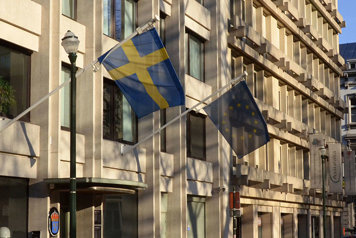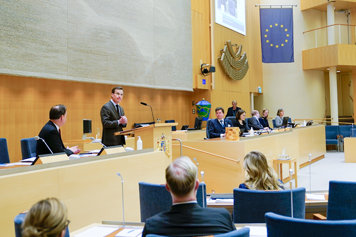Content about Sweden in the EU
Total 210 hits.
-
EU Statement on the Iranian drone and missile attacks against Israel
Statement by the High Representative on behalf of the EU.
Published · Statement from Ministry for Foreign Affairs
-
Unique Nordic-Baltic cooperation to support Ukraine’s closer ties to the EU
Minister for Foreign Affairs Tobias Billström is launching a high-level group that will provide expert support to Ukraine’s Government during its EU accession process.
Published · Press release from Johan Forssell, Tobias Billström, Ministry for Foreign Affairs
-
Foreign minister Tobias Billström to host Nordic-Baltic foreign minister meeting in Visby
On 9–10 April, Minister for Foreign Affairs Tobias Billström will host a foreign and security policy meeting in the Nordic-Baltic format (NB8) in Visby.
Published · Press release from Tobias Billström, Ministry for Foreign Affairs
-
"Sweden, France and Denmark calls for new global rules on exporting textile waste to developing countries"
Opinion piece by Romina Pourmokhtari, Minister for Climate and the Environment in Sweden, Christophe Béchu, Minister for Ecological Transition and Cohesion of the Territories in France and Magnus Heunicke, Minister for the Environment in Denmark, published in Dagens industri, March 25 2024.
Published · Opinion piece from Romina Pourmokhtari, Ministry of Climate and Enterprise
-
Tobias Billström's speech in Berlin on European Security
Speech by Minister for Foreign Affairs Tobias Billström at Hertie School in Berlin, Germany, 21 March 2024. Check against delivery.
Published · Speech from Tobias Billström, Ministry for Foreign Affairs
-
EU financial support for increased ammunition production in Sweden
The European Commission has decided to provide financial support to industrial projects aimed at increasing ammunition production capacity. The Swedish Government has decided to co-finance one of the projects, provided that the Commission granted support. This project, run by the Nammo Sweden AB company, could eventually triple the capacity for filling artillery shells in the coming years.
Published · Press release from Pål Jonson, Ministry of Defence
-
Statement by the High Representative on behalf of the EU on Russian presidential elections and their non-applicability on Ukrainian territory
The presidential elections held by Russia on 15-17 March took place in a highly restricted environment exacerbated also by Russia’s illegal war of aggression against Ukraine.
Published · Statement from Ministry for Foreign Affairs
-
Ministerial statement on proposed EU Pharmaceutical Legislation
Statement from Deputy Prime Minister and Minister for Energy, Business and Industry Ebba Busch and Minister for Health Care Acko Ankarberg Johansson
-
Statement by Minister for International Development Cooperation Johan Forssell
At the initiative of Sweden, in a meeting with foreign ministry representatives in Israel, a large group of EU Member States and other parties today conveyed the urgent need to improve humanitarian access to Gaza.
Published · Statement from Johan Forssell, Ministry for Foreign Affairs
-
Deeper defence cooperation between Sweden and Germany
On 5 March, Minister for Defence Pål Jonson received his German counterpart Boris Pistorius.
Published · Press release, Webcast from Pål Jonson, Ministry of Defence
-
"The NB8 visit to India focuses on cooperation and trust"
Opinion piece, The Hindu, 24 February 2024, by Lars Løkke Rasmussen, Minister for Foreign Affairs, Denmark, Margus Tsahkna, Minister of Foreign Affairs, Estonia, Elina Valtonen, Minister for Foreign Affairs, Finland, Bjarni Benediktsson, Minister for Foreign Affairs, Iceland, Krišjānis Kariņš, Minister of Foreign Affairs, Latvia, Gabrielius Landsbergis, Minister of Foreign Affairs, Lithuania, Espen Barth Eide, Minister of Foreign Affairs, Norway, Tobias Billström, Minister for Foreign Affairs, Sweden
Published · Opinion piece from Tobias Billström, Ministry for Foreign Affairs
-
Thirteenth package of sanctions against Russia adopted
The EU has adopted its 13th package of sanctions against Russia, focusing on companies in the Russian arms industry. With this package, there are now more than 2 000 names on the list of individuals and entities subject to sanctions.
Published · Press release from Tobias Billström, Ministry for Foreign Affairs
-
Israel/Palestine: Statement by The Foreign Ministers of Austria, Belgium, Bulgaria, Croatia, Cyprus, Czech Republic, Denmark, Estonia, Finland, France, Germany, Greece, Ireland, Italy, Latvia, Lithuania, Luxembourg, Malta, Netherlands, Poland, Portugal, Romania, Slovakia, Slovenia, Spain and Sweden
We are very concerned about the humanitarian situation in Gaza and the suffering of the hostages as well as the Israeli government’s plans for a possible ground operation in Rafah, where well over a million Palestinians are currently sheltering from the fighting.
Published · Statement from Tobias Billström, Ministry for Foreign Affairs
-
This is the Ministry of Health and Social Affairs
Brochure in pdf format that presents the Department of Social Affairs' areas of responsibility, organization and management.
-
A fast-paced year of work against antimicrobial resistance (AMR)
One of Malin Grape's main tasks is to promote the visibility of the government's priority issues in the field of antimicrobial resistance in the international arena and to contribute to a strengthened global dialogue. As Swedish Ambassador for work against AMR, she highlighted this issue at several key forums in 2023, including during the Swedish Presidency of the Council of the European Union and at the World Health Assembly (WHA).
Published · Article from Ministry of Health and Social Affairs
-
More effective law enforcement through Sweden’s participation in EPPO
The Government today decided to refer a proposal to the Council on Legislation regarding amendments necessary for Sweden to able to take part in the European Public Prosecutor’s Office (EPPO).
Published · Press release from Gunnar Strömmer, Ministry of Justice
-
Competitiveness and green transition in focus when Prime Minister received Petteri Orpo and Ursula von der Leyen
On Friday 19 January, Prime Minister Ulf Kristersson received Finland’s Prime Minister Petteri Orpo and President of the European Commission Ursula von der Leyen in Stockholm. Topics discussed during the visit included current EU issues, support to Ukraine, competitiveness and the green transition.
Published · Article from Ulf Kristersson, Prime Minister's Office
-
Prime Minister to receive Petteri Orpo and Ursula von der Leyen
On Friday 19 January, Prime Minister Ulf Kristersson will receive Finland’s Prime Minister Petteri Orpo and President of the European Commission Ursula von der Leyen. A joint press conference will be held in the afternoon.
Published · Press release, Webcast from Ulf Kristersson, Prime Minister's Office
-
Finland, Estonia and Sweden emphasise the importance of resilient European submarine infrastructure
The telecommunications ministers of Finland, Estonia and Sweden stress that the resilience of critical underwater infrastructure is now more important than ever. The ministers underlined the importance of resilient infrastructure at the Telecommunications Council in Brussels 5 December 2023.
Published · Press release from Erik Slottner, Ministry of Finance





